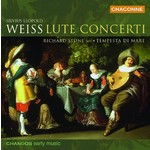
Lute Concerti
 $28.00
Out of Stock
$28.00
Out of Stock2-6 weeks add to cart
WEISS
Lute Concerti
Richard Stone (lute) / Tempesta di Mare
[ Chandos / CD ]
Release Date: Saturday 1 May 2004
This item is currently out of stock. We expect to be able to supply it to you within 2 - 6 weeks from when you place your order.
'Clearly a lot of work has gone into the reconstructions and they not only convince, they delight.'
International Record Review
Silvius Leopold Weiss was the greatest lutenist of the eighteenth century, according to both contemporary and modern critical appraisal.
Weiss's ensemble compositions have remained hitherto obscure because they are all incomplete. Only the lute tablature part remains in the known manuscripts. Richard Stone has reconstructed the flute and bowed-string parts heard on this recording.
This is the world premiere recording of these important concertos.
The baroque ensemble Tempesta di Mare is named after Vivaldi's concerto The Storm at Sea. The group, which originates from Philadelphia, has appeared at the Prague Spring Festival and the Amherst Early Music Festival, and will be performing regularly throughout Pennsylvania over the coming year.
The virtuoso lutenist Silvius Leopold Weiss spent almost his entire life in the service of royalty and the aristocracy. He made his debut as a musician at the age of seven before Emperor Leopold I, and served Count Palatine Karl Philip von Neuburg and Prince Alexander Sobieski before joining the Saxon court orchestra in Dresden in 1718. In his own time he was hailed as the greatest lutenist and lute composer in Europe.
Weiss composed the largest surviving corpus of solo lute music in the history of the instrument, and it is for this excellent body of work that he is known to connoisseurs of the lute today. Yet he also wrote a large amount for ensemble with lute – a repertory that is currently far less familiar than his solo works. Richard Stone has established that nineteen concerted works by Weiss survive, and that several more – perhaps dozens – have been lost. These comprise duets (for two lutes, or lute and flute), trios and concerti featuring the lute as the solo instrument.
Whilst Weiss uses types of figures characteristic of the time in these concertos, the phrases are not clichéd nor overly predictable, and many passages feature affecting melodies akin to those we know from his finest solo lute works. From these convincing reconstructions and our new knowledge that there were yet more Weiss concertos, it is apparent that only their incomplete nature prevents Weiss from being recognised as a major composer in the late baroque concerto genre.
Reviews
'Tempestas team spoke the music like a native language.'
The American Journal of Classical Guitar
'Tempesta di Mare offers superb support…'
American Record Guide
'… compulsive listening…'
BBC Music Magazine
''[Richard] Stone has lots of technique and shines in the soloist's role. Even greater, arguably, is his successful realisation of the orchestral parts. It may sound a highly dubious idea, but in fact it is not at all in principle out of order to reconstruct an orchestral score from a soloist's part, because many of the ideas will be transferable, and the basic harmonic and structural design is already present. To these ears, the orchestral writing is entirely convincing and the players tuck into it with gusto and panache, the buzzy string sound and the woody tone of the baroque flute recorded in a spacious and expressive acoustic.''
Classical Guitar Magazine
''Stone's playing is agile and confident, his sound round and full. These characteristics are essential to project the instrument's small voice in a concerto. The players of Tempesta di Mare supply a lovely, understated accompaniment that is historically informed but without any ornamental gimmickry.''
American Record Review
''Clearly a lot of work has gone into the reconstructions and they not only convince, they delight.'
International Record Review
''The flautist Gwyn Roberts (soloist in two of the concertos for flute with solo lute accompaniment) deserves a special mention, as does Stone himself.''
Gramophone
''Reconstructed scores by Baroque lutenist Richard Stone are serious competition for Vivaldi's Lute Concerto. The lute-flute duets are a rapturous combination of sounds.''
Classic FM Magazine
Tracks:
Concerto a cinque in C major, SC 90
Concerto in D minor, SC 58
Concerto for lute and flute in F major, SC 9
Concerto grosso in B flat major, SC 57
Concerto in F major, SC 53
Concerto for lute and flute in B flat major, SC 6
